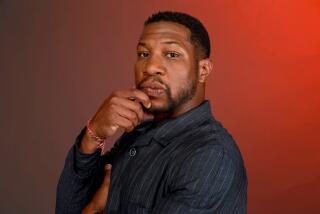McMartin Witness: 8 Days on Stand End
With prosecutors contending that she either wore blinders or lied to protect a friend, Betty Raidor, a key defense witness in the McMartin Pre-School trial, haltingly climbed down from the stand this week after eight days of testimony in which she vehemently denied knowledge of any molestations.
In its direct examination, the defense portrayed the stern, 69-year-old former teacher as an astute observer and strict disciplinarian, who would have known if children were being sexually abused and would have immediately reported it to authorities.
Throughout four days of cross-examination that ended Thursday, however, the prosecution sought to suggest that she was either cooperating in a cover-up, oblivious to what was going on around her or perhaps a participant herself in the alleged crimes.
Defense attorney Dean Gits said he believed that Deputy Dist. Atty. Lael Rubin’s cross-examination had not damaged Raidor’s credibility and that her inconsistencies were “minimal.”
Viewed as Crucial
“She’s exactly the kind of person who would have been the first to blow the whistle” had she seen anything untoward, he said.
Raidor is viewed as crucial to the defense’s case, because she worked at the school throughout the six-year period during which defendant Raymond Buckey joined the staff of his mother’s Manhattan Beach nursery school.
Buckey, 30, and his mother, Peggy McMartin Buckey, 62, are charged with 65 counts of molestation and conspiracy involving 11 youngsters between 1978 and 1983.
Raidor was one of the final witnesses Los Angeles Superior Court Judge William Pounders said he would allow the defense to call in his last-ditch effort to avoid a mistrial that the loss of three more jurors would cause.
What is now the longest and costliest criminal trial in U.S. history began with a 12-member jury and six alternates. Four on the panel have been excused for reasons ranging from health problems to inattentiveness. Pounders is trying to prevent the loss of a fifth, whose company is folding, by putting him on the county payroll.
Denied Knowledge
Called as a defense witness by Gits, Raidor--who was originally accused in the case but later had the charges against her dropped--denied any knowledge of sexually inappropriate activities at the preschool. She said the children were “crazy about Raymond (Buckey)” and were always “climbing on him.”
However, on cross-examination by Rubin, she described Raymond Buckey as an “incompetent” teacher, admitted she had been “called on the carpet” by his mother for criticizing him and expressed resentment that he was allowed privileges--such as leaving the school during school hours--denied other teachers.
Raidor said Raymond Buckey had no control over the children entrusted to him, taught them to climb the side fence, let their noisy play get too loud and did not appear to have any organized program of activities.
The defense, after calling numerous witnesses who testified they saw nothing suspicious going on during the morning sessions, focused on Raidor’s testimony on the afternoons, when both she and Raymond Buckey were working.
Raidor was usually present when Raymond Buckey worked afternoons, although he was occasionally left alone with children, according to her testimony and school records. Raidor said she did not work afternoons during the summer of 1983, when allegations against Buckey first surfaced.
Raidor testified that, beginning in the fall of 1981, Raymond Buckey was in charge of the children who stayed afternoons but did not take naps. He was not at the preschool at all during the years the older alleged child victims testified he molested them, she said.
Buckey began teaching in September, 1981, but had helped out as early as October, 1980, becoming an aide to his mother in January, 1981.
During her fast-moving and often testy cross-examination, prosecutor Rubin confronted Raidor with five tape-recorded statements she had made to investigators that conflicted with her court testimony.
For example, in an attempt to contradict Raidor’s defense of Buckey, Rubin cited an interview with Raidor by Manhattan Beach detectives in which Raidor said she thought it was inappropriate or improper for Buckey to have little girls sitting on his lap.
Explained Remark
Presented with the interview remarks, Raidor said in court she saw no sexual impropriety in that act but simply believed that the children ought to be playing with their peers instead.
Taken individually, the inconsistencies appear minor, but prosecutors said they revealed a pattern in which Raidor slightly altered her prior statements to suit the Buckeys’ defense.
“It is clear that what we saw,” Rubin said outside court afterward, “is a picture of a woman who has lied across the board. She has come across loud and clear as someone who knew what was going on and has refused to talk about it, or she is someone who didn’t know and purposely avoided seeing what was going on. Her motivation? Friendship and employment.”
The defense has contended that the school was so small that molestations could not have taken place without others’ knowledge. Yet, during Raidor’s four days of cross-examination, Rubin pointed to one incident in 1979 in which one of Raidor’s students was so severely injured on the playground that she required six stitches in her head. Raidor testified that she failed to notice the injury and did not report it to the girl’s parent at the close of school.
Said co-prosecutor Roger Gunson: “Raidor was either unaware of or hiding that incident. The same could be true of the molestations.”
More to Read
Sign up for Essential California
The most important California stories and recommendations in your inbox every morning.
You may occasionally receive promotional content from the Los Angeles Times.










